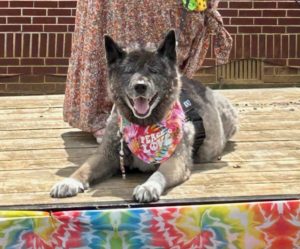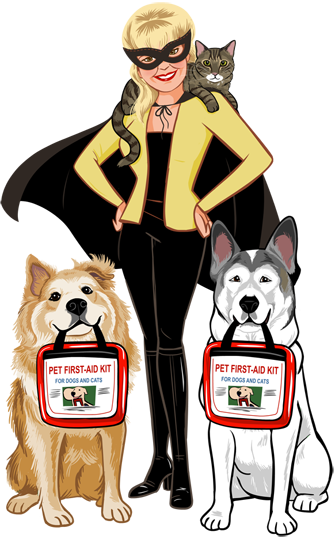
When you are looking for a new furry friend to add to the family, please don’t pass by the senior dogs for the cute bouncy puppy. Older dogs have earned their wisdom fur and want nothing more than to live out their golden years surrounded by a loving family and a warm bed. They still have a lot of life to live and so much love to give, and older canines with their frosty brows and grey muzzles are doggone adorable!
What You See Is What You Get!
Unlike puppies, older dogs have grown into their shape and personality so from Day One, you know who they are. With an older dog, you will not have to go through the constant clean-up from housebreaking or lose precious items due to chewing. Older best friends have better focus. They learn more quickly and already understand “no.” Older dogs know what it takes to be part of a pack, a family unit, yet they also leave you time for yourself. They let you get a good night’s sleep as they have grown accustomed to human schedules and do not demand nighttime feedings, comforting or potty breaks. A senior dog is grateful for the second chance he has been given and finds joy in laying by your side looking at you adoringly.
Now this is not to say everything will be perfect from the moment your older pal arrives home. You must take the time to show your new dog where to go to the bathroom, what furniture, if any, they are allowed on, where their bed is and where they eat. Set ground rules and stick to them, but also realize there are special considerations to keep in mind for an older dog, so be kind and patient.
Exercise
Stretch those legs daily to circulate blood and oxygen and keep joints flexible. Cold and wet weather may make aging joints ache, but daily exercise is a must, so supervise your pooch on a romp indoors chasing a ping pong ball or do laps at the local pet or hardware store to keep those legs warm and moving even when weather isn’t the best.
Engaging in physical activity together is an important component of the human-animal bond. Humans and dogs are the only two species that interrelate this way. Dogs and people were designed to walk, run, and play side by side.
Just remember that although senior dogs need exercise, they also need time to rest, so pace their activity time and level of exertion, and talk to your veterinarian about any concerns.
Nutrition
What you put into your senior dog is what you will get out of him, literally! Read labels looking for high quality proteins, ingredients you can pronounce and no fillers (corn, soy and wheat which often cause allergies). Of prime importance is to discuss your pet’s diet with your veterinarian or canine nutritionist so that you are feeding what is best for your one-of-a-kind senior dog. Even biological canine siblings don’t always thrive on the same diet, so if you have a multi-dog household, all may not eat the same meal. The best food for a dog is the food he does best on.
Be aware that some foods you enjoy are poisonous to our canine pals: grapes, raisins, chocolate, certain nuts, xylitol and many more items in your pantry and medicine cabinet.
Don’t mistake treats for love. Shower your older fella or lady with belly rubs, ear scratches and time spent with you. Keep snacking to a minimum for the sake of his or her waistline, joints, heart, lungs and kidneys.
Keeping a dog lean has been shown to be able to extend his life and quality of life, hopefully avoiding or minimizing issues such as osteoarthritis and even diabetes.
Some older dogs stop eating because their sense of smell diminishes. Try for yourself, there are some foods that just do not taste the same if you can’t smell them! If your best pal needs a bit of encouragement to chow down, warm up the food ever so gently or add smelly but wondeRUFFully healthy Omega 3 fish oils to wake up his olfactory senses. If that doesn’t do the trick, a trip to the doggie dentist might be in order. A toothache or abscess just might be making it too painful to chew.
Training & Mental Stimulation
Keep your senior dog mentally and physically fit. It can keep his weight down, his joints flexible, his bones strong and his brain sharp. Brush up on commands he learned as a puppy for safety’s sake, and then throw in a new one or two. You can, in fact, teach an old dog new tricks!
- Leave it! will prevent him from eating that gooey, smelly oh-so-tempting puddle on the floor that could be toxic!
- Sit is polite and allows you to put on your dog’s leash or wait for a treat.
- Stay and Come keep him from running into the path of a car.
- Heel is like a game of follow-the-leader keeping your best pal by your side.
Puzzle-games, basically hide ‘n seek for treats, can be as simple as placing a dog biscuit under one of three paper cups, and having your pooch find it. You can also hide treats under a blanket or in a snuffle mat, but also try taking your morning walk backwards or to a new location, so that your furry best friend can sniff new smells and see new things, engaging all his senses.
Don’t think of your senior dog as tired and old but instead as a pal in retirement. He still has good years ahead of him and can enjoy walks, fun but low-impact activities such as swimming and nose work, and toys that challenge his brain, keeping it sharp.
—America’s Veterinarian, Dr. Marty Becker
Snout-to-Tail Check-up
One of the most beneficial things you can do is get to know your senior pet from snout-to-tail by feeling his entire body each week and paying attention to habits. Gently feel from the tip of his ears down to the end of his waggly tail checking for lumps, bumps, parasites, burrs – anything that should not be there. A change in appetite, bowel movements, stance, behavior, sleeping habits or anything, can potentially be a sign of something not right. Catching a problem early and reporting it to your veterinarian could be a lifesaver!
Bi-annual Veterinary Exams
Regular visits keep Fido at his peak and ward off possible disease through early detection. A dog can have loss of kidney function and still appear fine on the surface. Schedule lab tests twice a year for golden oldies to keep tabs on their internal functioning and catch problems early when they are more manageable.
As pets age, they need more frequent medical examinations and diagnostic workups such as blood work, urinalysis, blood pressure measurement and even x-rays to detect early signs of disease. Most dogs are not ‘too old for a dental’; as long as they are relatively low risk with underlying diseases stabilized, good dental care can greatly improve not just the quality, but possibly even the ‘quantity’ of life.
–Heidi Lobprise, DVM, DAVDC
If your aging dog is stiff from arthritis, know that he doesn’t have to limp around or be in pain. Your veterinarian can prescribe a combo of medications and supplements that will put a spring back in his step and help him sleep more restfully. And if your pooch is overweight, helping him shed a few pounds is the best thing you can do to relieve stress on achy joints.
–America’s Veterinarian, Dr. Marty Becker
And keep in mind that if your sweet pooch has been a bit on the grouchy side lately, it may be due to a medical issue. Get him checked out! Pain can make anyone cranky and prone to snap!
TLC
As your dog ages, he may feel the urge to answer nature’s call more frequently and may not be able to let you know quick enough. Help him by increasing the frequency of potty breaks, installing a doggie door to a securely fenced yard, lining bedding with plastic to make for easy clean-up. Make your life simpler, as well as your dog’s, so that you can return that unconditional love and put any frustrations to rest.
Using runners on slick floors can really help an older dog get around better. Some even benefit from ‘toe grips’ placed on the nails that help provide better traction.
–Heidi Lobprise, DVM, DAVDC
Consider a ramp or steps to allow your senior to curl up on the bed or sofa next to you. If your senior enjoys watching the mailman from a window he can no longer reach, slide a hassock or cushion underneath to allow his fun to continue. Above all, never lose patience with your loyal best friend. They are around too short of a time, but by adopting a senior, you can make whatever time he has special, and it will enhance your life as well. Even when we adopt a puppy, we aren’t guaranteed a certain number of years. Nothing can make you feel better than providing a loving forever home (no matter how long that forever is) for an older best friend!








